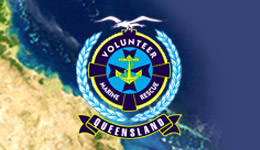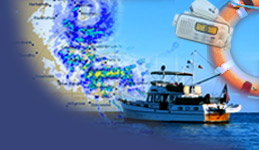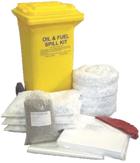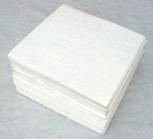Respond to Emergency Situations | Managing Spills |
Preventing Oil Spills
Under the current vessel provisions of the Transport Operations (Marine Pollution) Act 1995 it is illegal to discharge oils from a vessel. As such, great care and planning should go into all refuelling operations to ensure that oil pollution does not occur. Such provisions should include:
- Checking the capacity of the fuel tank before refuelling
- When refuelling, inserting the nozzle into the filler before starting the pump and ensuring that fuel has stopped flowing before removing the nozzle
- Watching the fuel tank vents (breathers) for signs of blowback or overflow
- Using absorbents to clean waste oil from your bilge
- Always supervising the operation of the bilge pumps to ensure only water is being pumped into coastal waters
Spill Kits
Land Spill and water spill kits are available at ports and designated refuelling sites, and must be used in the event of an oil spill.
Land Spill KitA typical land spill kit contains prosorb, booms, pads, pillows, drum seal, gloves and plastic bags for the disposal of used materials. These kits are intended to intercept, contain and clean up spills before they reach water. |
|
Water Spill KitA typical water spill kit contains oil mops, pads, booms, gloves and plastic bags for the disposal of used materials. Intended for the containment and clean up of oil and fuel spills floating on water. Local authorised officers, marina owners and key users have been trained in the correct use of these kits. In case of a spill, their assistance should be sought in the first instance.
|
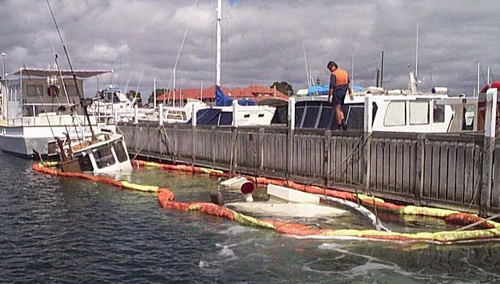 |
Procedures in the Event of Fuel Spillage
In the event of a spillage of diesel fuel or other pollutants into the water:
- Stop the flow of fuel or pollutant into the sea.
- Attempt to contain the spill unless it is petrol. Petrol is extremely flammable and spills should be left to professionals who have experience in dealing with these spills.
- Inform crew and ships in the immediate vicinity that a spill has occurred and a fire hazard may exist
- Inform the Harbour Master / Port Authority
- Minimise the effect and spread of the spillage (spill booms, absorbent pads and materials
- Record all spillages and the action taken in the ship's log book.
- In case of a small spill, absorbent pads should be immediately placed on the spill and then removed and disposed of appropriately.
- In case of a larger spill, the pads may have to be used in conjunction with a boom and mop in order to contain the spill. The boom and mop can be used both on water and on land.
- For land based spills, telephone the Metropolitan Fire Service or Country Fire Service for help with the cleanup.
